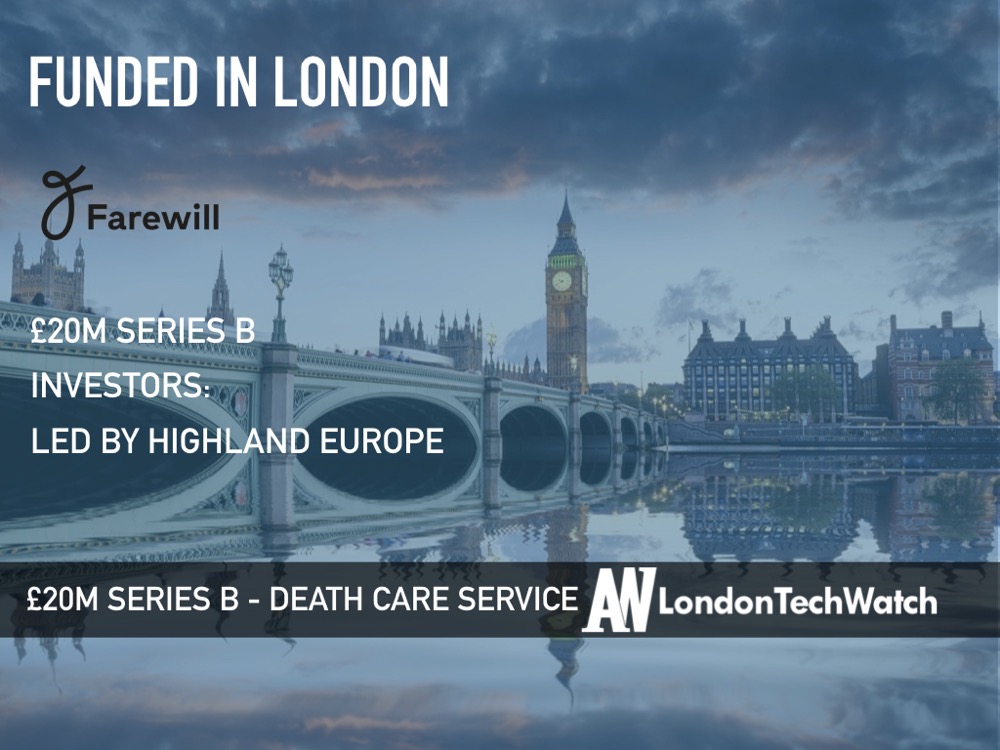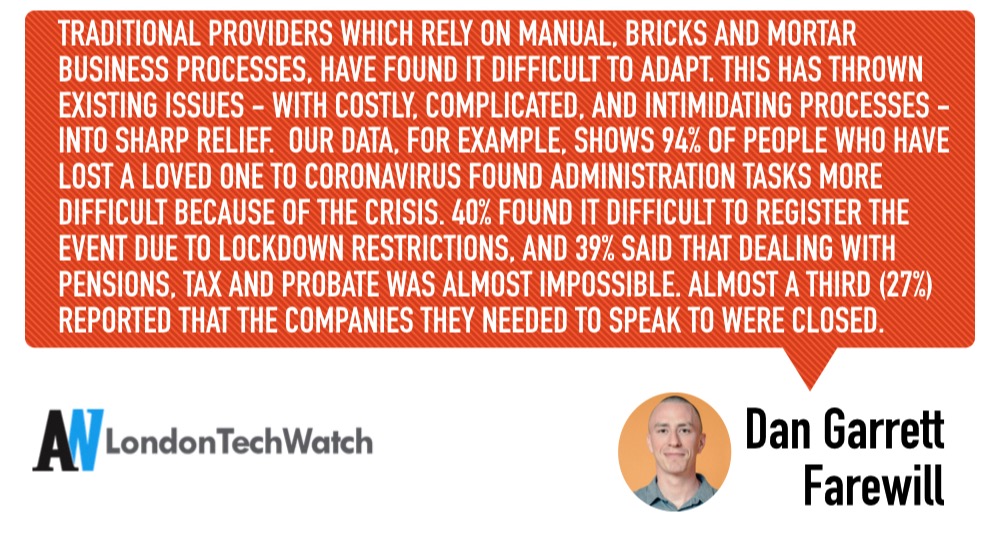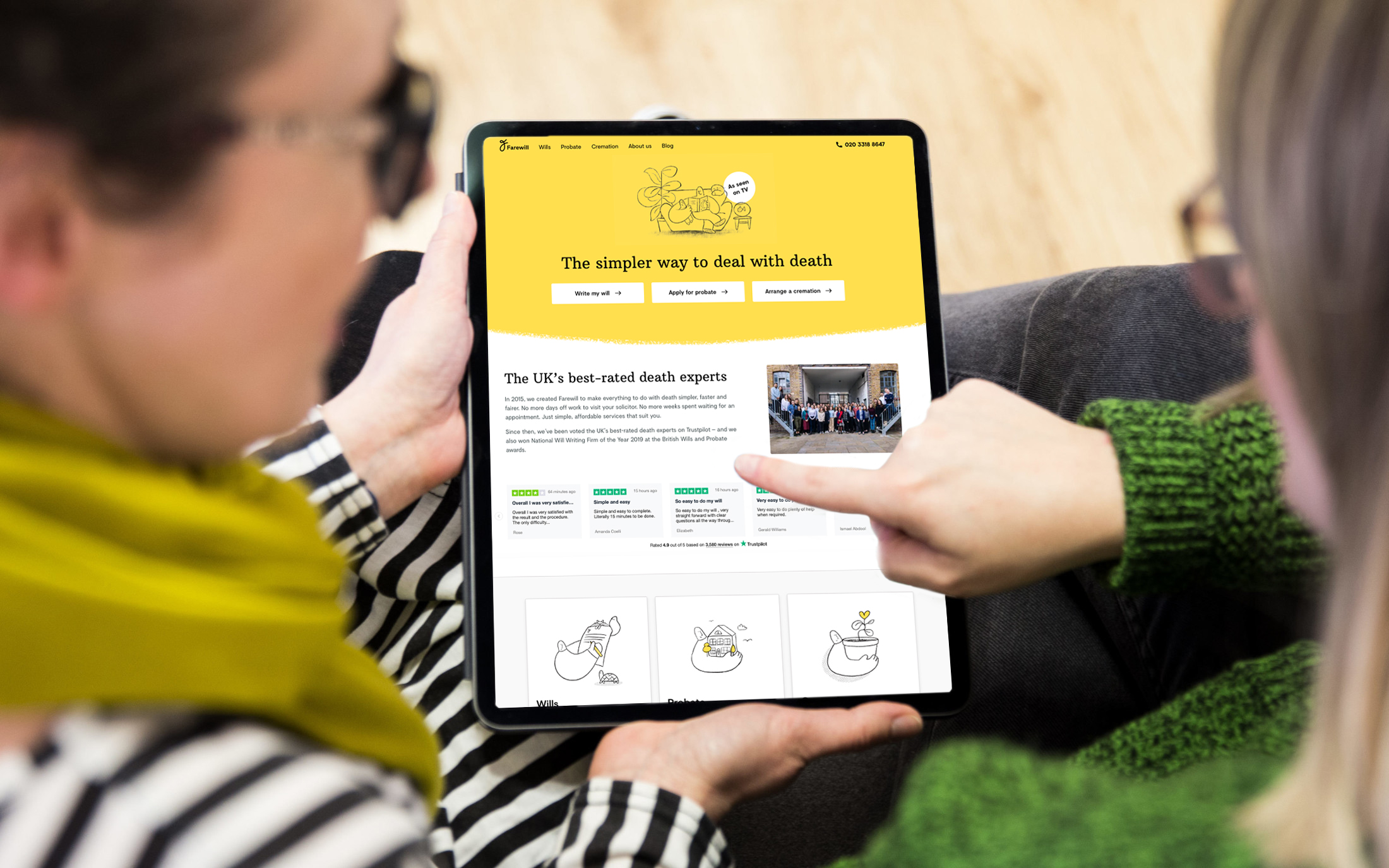Death is an uncomfortable topic. The death care industry is a multibillion-dollar industry that has been siloed from the digital transformation that industries like finance, real estate, and insurance have experienced. Farewill changes how people prepare and manage death. Traditional arrangements for death require multiple face-to-face meetings and the average cost of dying is almost £10K in 2020. Farewill significantly reduces the cost and time it takes to arrange the preparation of wills, probate, and funeral plans. From the comfort of your own home, Farewill’s platform allows users to write wills within 15 minutes, apply for probate through a single provider, and plan a simple cremation. Farewill’s service is growing and it recently launched LPAs (lasting power of attorney), expanded its telephone wills service, and plans to add features such as giving customers the option to attend funerals this year.
London TechWatch caught up with CEO and Cofounder Dan Garrett to learn how Farewill is destigmatizing the death industry. Farewill has grown 10x within 18 months, and after this recent funding, it plans to double its headcount from 90 to 180 people. Farewill was launched in 2015 and has raised £39M across six rounds.
Who were your investors and how much did you raise?
Our latest funding round was led by Highland Europe and raised £20M. It takes the total raised to date to £30M.
Tell us about the product or service Farewill offers.
We use design and technology, combined with brilliant customer service, to make the death industry simpler, fairer, and friendlier. We offer wills, cremations, and probate services, all easily accessible online.
What inspired the start of Farewill?
Well, I was actually working in a Japanese residential home when I realised the problems with death care. When I returned to the UK, I made it my mission to find out as much as possible about will-writing and funerals. I organised 15 funerals and got my will-writing qualifications, and through this process, actually became increasingly concerned about the industry’s reliance on complicated, costly, and intimidating processes. I just thought that the system could be reinvented. With my cofounder Tom Rogers, we created Farewill to make this vision a reality.
How is Farewill different?
 Everyone at Farewill is set out to change the way the world deals with death. Currently, the industry relies on processes that haven’t changed for more than 150 years. They’re complicated, costly and intimidating, creating stress at a time when that’s the last thing anyone needs.
Everyone at Farewill is set out to change the way the world deals with death. Currently, the industry relies on processes that haven’t changed for more than 150 years. They’re complicated, costly and intimidating, creating stress at a time when that’s the last thing anyone needs.
Many of the default options just don’t meet people’s needs, both from an emotional as well as a financial perspective. The average cost of dying is the highest it’s ever been in the UK (almost £10K in 2020), forcing 1 in 8 families into funeral poverty, and less than 5% of the market is currently online.
The industry is in urgent need of transformation and we’re determined to lead the change – and make death easier for everyone.
For example, at Farewill:
You can write a will from your sofa in 15 mins. It takes an average of 24 hours to get it checked and costs from £90. (That’s half the UK average price and a fraction of the average time.)
You can apply for probate from the comfort of home, do everything through one provider, and pay a single, fixed fee, from £595. The application takes 7 days to prepare.
(The UK average is three weeks, charges vary as they’re often a percentage of the estate, and there are normally multiple parties involved.)
You can plan a simple cremation from the comfort of home, pay from £980 and have Farewill look after the process so you can focus on the memorial, and saying goodbye the way you’d like to.
(The UK average funeral cost is 5 times this. Funeral-planning normally involves numerous face-to-face meetings, and the structure for a traditional funeral is often very rigid).
All three of these services can be done online, at a time that suits you, giving you more control. We avoid legal jargon, and we have an amazing team of in-house specialists working behind the scenes, who are available seven days a week, whenever customers need to chat.
All of this means people are able to arrive at an outcome that best suits them, rather than the provider.
What market is Farewill targeting and how big is it?
It’s a vast market that has been largely untouched by technology. Over the next 10 years, £1T will pass between generations – doubling between 2017 and 2027 – and currently under 5% of the market is accessible online.
What’s your business model?
Farewill reduces the cost of death care while still making a profit and investing in its services.
Farewill’s will writing service costs £90 per person
(That’s half the average UK cost)
Probate service starts at a single, fixed price of £595
(Normally costs are a percentage of the estate – up to 5% – and there are additional fees)
Its simple cremations cost from £980
(That’s a fifth of the average cost of a traditional funeral)
Both Farewill’s platform and back-office system have been built from the ground-up with proprietary technology, and we are continuing to invest in tech-based improvements to make the service more efficient, driving improved customer cost savings as well as our margins.
In 2019 we delivered revenues approaching £500K and are forecast to achieve revenues of £3.3M by July 2020 and £21.5M by the end of 2021.
How has COVID-19 impacted your business?
It’s forced millions of people across the UK to confront death in 2020. It’s thrown into sharp relief the problems with the complicated, costly and intimidating processes surrounding death, and demonstrated the need for a simpler, fairer and friendlier solution.
It’s also inevitably increased people’s need to access death care services, often in extremely stressful circumstances. Traditional providers that rely on manual, bricks and mortar business processes, have found it difficult to adapt. This has thrown existing issues – with costly, complicated, and intimidating processes – into sharp relief.
Our data, for example, shows 94% of people who have lost a loved one to coronavirus found administration tasks more difficult because of the crisis. 40% found it difficult to register the event due to lockdown restrictions, and 39% said that dealing with pensions, tax and probate was almost impossible. Almost a third (27%) reported that the companies they needed to speak to were closed, and 24% were told services were ‘on hold’.
Our digital-first service has seen growth throughout this period. There has been huge demand for simple, fair and friendly services like ours.
When will-writing increased by over 300% in March, we were able to meet this need without any loss of service, despite having to move to a 100% remote-based working model. We then went on to offer free wills for NHS staff, so we quickly created a process to fast-track wills for frontline workers, hired an extra 20 staff, started opening on Sundays, and launched a new telephone wills service to serve people who aren’t online or who have complex needs.
What was the funding process like?
Really fun – we were well prepared and I like the intensity & focus of it. It’s a team sport and we have a phenomenal leadership team who all played a major part.
It took me three months to get ready – endless iterations on our fundraising deck before we were ready to go.
What are the biggest challenges that you faced while raising capital?
The most important thing is for there to be people in your team who have your back while you’re out on the road.
For me that’s Constance (COO), Tom (CPTO – cofounder), and Angela (Chief of Staff) – I’ve got total trust in them, so I can focus completely on the raise.
It’s really tough to deal with disappointment while you’re out being the hype-person. Tough when funds you like drop out and you just have to soldier on.
It’s really tough to deal with disappointment while you’re out being the hype-person. Tough when funds you like drop out and you just have to soldier on.
What factors about your business led your investors to write the check?
“How about entirely removing the administrative pain for those grieving for their loved ones? How about providing an affordable, effortless and considerate service? That’s what the Farewill team is doing – with an extraordinary blend of compassion and tech-fueled efficiency,” – Stan Laurent Partner at Highland Europe and previous Chief Executive of PhotoBox.
“Farewill has made phenomenal progress since our initial investment 18 months ago. They have grown by 10x and launched a suite of successful new products. This additional capital will provide further opportunity for the company to innovate an archaic industry and become the leading digital platform in death services.” – Tim Levene, CEO of Augmentum Fintech.
What are the milestones you plan to achieve in the next six months?
The investment will be used to grow the world-class team, to improve the service on an ongoing basis, and to diversify the service offering. For instance, the company just launched LPAs (lasting power of attorney), will expand its telephone wills service, and plans to give customers the option of attended funerals this year.
What advice can you offer companies in London that do not have a fresh injection of capital in the bank?
Prepare 5x more than you think you need to. At Series B you need compelling answers to a lot of questions. Your leadership team needs to be well versed in handling those conversations. And run a fast, intelligent process. You have to manage the sales funnel – daily standups, pipelines, backchanneling – leave no stone unturned and try and sprint over the line rather than drag it out. But most importantly, take the time to get excited about your company before you raise. Our vision always gets clearer and bigger when we raise. The energy is infectious when you nail it!
Prepare 5x more than you think you need to. At Series B you need compelling answers to a lot of questions. Your leadership team needs to be well versed in handling those conversations…But most importantly, take the time to get excited about your company before you raise. Our vision always gets clearer and bigger when we raise. The energy is infectious when you nail it!
Where do you see the company going now over the near term?
We’ve built an outstanding reputation with our customers. We’re the highest-rated financial or legal business globally on Trustpilot. So, the dull (but not dull) answer is that we’re going to carry on investing in re-inventing the world of death – we’re launching new products, improving current ones, and not losing sight of our mission to change the way the world deals with death.
We’re also building out our team – approximately doubling our headcount from 90 to 180 in the next 12 months.
What is your favorite restaurant in London?
It’s got to be Euro Cafe on Kingsland Road in Haggerston. My rock.
You are seconds away from signing up for the hottest list in London Tech! Join the millions and keep up with the stories shaping entrepreneurship. Sign up today






